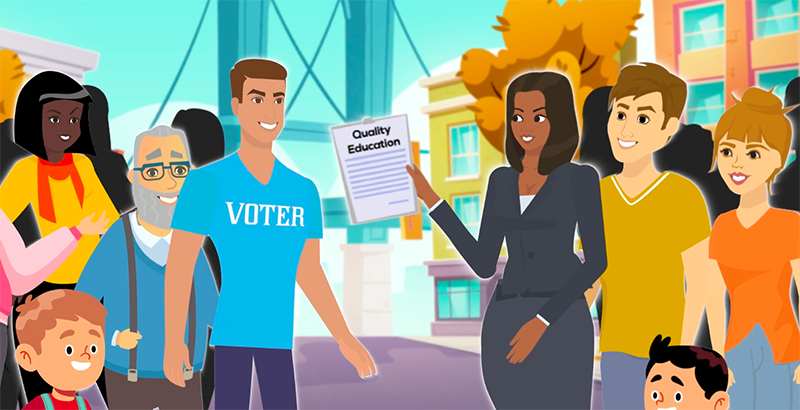Austin: It’s Long Past Time to Put Kids First By Making Education a Civil Right for all Students

Get stories like this delivered straight to your inbox. Sign up for The 74 Newsletter
The author will be part of an elite panel of experts Wednesday discussing the growing movement to establish a constitutional right to quality public education. Click here for details and registration information.
Marking the third Martin Luther King holiday of the pandemic has highlighted the cruel open secret that American public education is decidedly not a civil right. Politicians have talked about education as a civil right for generations. But COVID-19 has exposed those claims as tragically hollow rhetoric.
A recent New York Times column by David Leonhardt titled “No Way to Grow Up” illustrates how children hold the least risk from COVID but have borne the greatest burden. Leonhardt writes that kids face more risk from car rides than from COVID, but I watched my own daughters sacrifice friends, soccer and full-time in-person school for well over a year. Leonhardt quotes a parent declaring that “for so many kids, school represents a safe, comfortable, reliable place, but not for nearly two years now.”
As the son of an alcoholic father who committed suicide when I was 16, I found school to be that safe, comfortable, reliable place for me. My teachers saved me. They are the reason I am typing these words right now.
I expect and demand that public education provide that same safe, comfortable and reliable place for my own daughters. And that’s exactly what most children, especially low-income children and children of color, have been systemically denied. Even before the pandemic shuttered their schools, less than 20 percent of Black students in America were reading at grade level.
Public school parents are pissed. We are organizing across traditional lines of difference because we are recognizing that we have more in common with each other across race, geography, ideology and socioeconomic status than we do with the defenders of an unjust status quo. Many parents at my daughter’s Los Angeles district school who marched with the teachers union two years ago during their strike have watched from the sidelines as a negotiated reduction in teacher work time cut 12 million instructional hours, which the union then justified with the Orwellian declaration that, “there is no such thing as learning loss.”
Last year, many of those same grass-roots public school parents organized to file a lawsuit against the L.A. Unified School District to reopen our schools that had been shuttered for the pandemic. The district’s response said the quiet part out loud: In its court filing, the district argued that because students do not have a constitutional right to a quality public education, it has no legal obligation to provide one, and parents have no standing to challenge reopening policies, or anything else.
Parents across Los Angeles and America are revolting against this intransigence. We recently saw the impact of this revolution at the ballot box in Virginia, where Democrat Terry McAuliffe lost his gubernatorial race by essentially telling parents to shut up and leave education to the so-called experts.
Parents are now organizing with advocates in Minnesota, California and several other states to establish a constitutional right to a high-quality public education and a long-overdue seat at the table for public school parents.
This new right would empower families to hold politicians accountable for actually putting students first. Such a tool would be particularly valuable for communities of color, where politicians and bureaucrats have failed generations of children while ignoring generations of parents.
In his Letter from Birmingham Jail, King wrote, “a law is unjust if it is inflicted on a minority that, as a result of being denied the right to vote, has no part in enacting or devising the law.” Disenfranchised students forced by law to attend failing public schools that ultimately determine their destiny are poster children for King’s test. Students cannot vote and parents do not have lobbyists, so without a kids-first constitutional North Star, politicians have little incentive to listen to families or put kids first in the face of special interest opposition.
Opponents have labeled this theory of change as extreme. But King wrote, “the question is not whether we will be extremists but what kind of extremists we will be. Will we be extremists for hate or love?” Extremists for the status quo contend that establishing a constitutional right to a high-quality public education would generate too many lawsuits. But opponents of King used that same argument to oppose Brown v. Board of Education. Civil rights without leverage to enforce them are merely empty promises.
King wrote that “justice too long delayed is justice denied.” The children of America have waited long enough for justice. If our children are to inherit a world worthy of King’s vision, we must heed his call to reject the siren song of moderation: “We are now faced with the fact that tomorrow is today. We are confronted with the fierce urgency of now.”
For the sake of our kids, our democracy and our future, the time is now to be extremists for love. Now is the time to finally translate “kids first” from a soundbite into a civil right for the children of America.
Ben Austin is a founding co-partner of Education Civil Rights Now, a coalition of nonprofit organizations, community leaders and parents committed to establishing a civil right to a quality education across America
Get stories like these delivered straight to your inbox. Sign up for The 74 Newsletter

;)
